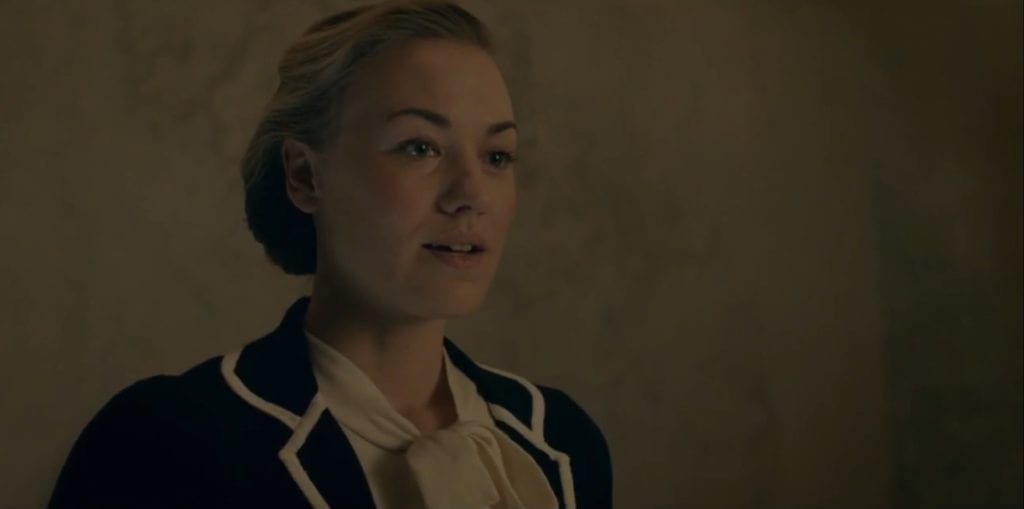The Handmaid’s Tale brought the sixth episode of its first season, “A Woman’s Place.” A good half of it is actually “A Wife’s Tale”, and it also gives us an interesting look at the international situation.
Recap
June remembers her sex with Nick, and determines it can never happen again.
We see handmaids cleaning the wall where the executed normally hang. They’re washing the blood away, in preparation for a trade delegation visit from Mexico.
The delegation is going to come to the Waterfords, in fact—June’s household. Mrs. Waterford makes sure everything is in order, including June. She also warns her that she might be asked something, and to answer “wisely”. Indeed, June has a chance to speak to the delegation and its female ambassador. However, it’s in the same room with three commanders and their wives, so she tells her that she chose to be handmaid and that she is happy.
She leaves the room, and the ambassador talks to Mrs. Waterford. We find out that when she was younger, Mrs. Waterford wrote a book called “A Woman’s Place,” where she argued for “domestic feminism.” The ambassador asks her if she ever imagined a world where women wouldn’t be able to read her book, or anything else. Mrs. Waterford admits she never did, but says God asks for sacrifices, and that it’s worth it.

We see flashbacks of a younger Mrs. Waterford with her husband, as they plan the new regime together and cooperate on all fronts. We also see that as the regime takes power, she is slowly but surely being pushed away.
The Commander asks June to come to him, and complains about how the delegation looked at them. He also insists it’s a privilege for her to be there with him. He ends up telling June to kiss him like she meant it. We later see June obsessively brushing her teeth.
There is a reception organised for the trade delegation, and the handmaids are asked there as guests of honour. Before they go in, Mrs. Waterford insists the “damaged ones” are taken away—the ones who’ve been mutilated by the regime. The rest comes in and is introduced by Mrs. Waterford, and everyone applauds them.
And then the high point of the evening comes: children born to handmaids in that district are taken in, and the ambassadors play with them. One of the handmaids tells June this is what Mexico wants to trade. They want to buy handmaids, to have children.

June is frustrated and goes to see Nick, telling him how she feels she should have said the truth to the ambassador. She tells him her real name. The proper term for what is being done to her is used for the first time, too: rape.
The ambassador comes to give June a goodbye gift, and June tells her the actual reality of her situation. The ambassador is sorry about that, but Mexico is dying out too, and that’s her priority. The ambassador’s (male) assistant, however, offers June help. He tells her that her husband is alive, and gives her pen and paper to get a message to him.
Review
There was a theme in this episode, and the theme was women who systematically hurt and oppress their own gender. If there’s a special place in hell for women who don’t support other women, I wonder what the place is for those who actively help their oppression. Not even Dante has the imagination for that—I suspect—but then, Mrs. Waterford might already be living it.
This episode was in many ways her story, but the writers managed to keep to focus on June firmly enough that it didn’t slip into uncomfortable territory. We see the issues Mrs. Waterford faces, but with June forcefully stating (twice) what is the reality of her situation, we are in no danger of relativizing that Mrs. Waterford was one of the chief architects of the monstrosity that is the Gilead regime. She is merely reaping what she sowed. That doesn’t preclude our compassion, but it throws it into proper perspective compared to June’s suffering. The framing was done truly excellently here.
The writing and direction of Mrs. Waterford’s scenes was excellent too. The gradual change in her ability to participate in the revolution and her gradual change in attitude was captured to perfection. When the Commander left for the first government meeting of the new regime and she stayed at home, you could practically see the “what have I done” in her mind. So the kudos for acting this episode goes to Yvonne Strahovski. It shows brilliantly that not even the women who are most ideologically in tune with the regime are truly happy in it. Because it brutally oppresses all of them. June is being raped every month, yes. But Mrs. Waterford, too, is being sexually abused in those encounters. No wonder the architects of the regime didn’t want her at their meetings, if this is what they were planning.

The other woman in “A Woman’s Place” who betrays and hurts her own gender—besides Aunt Lydia, naturally, but she is old news—was the Mexican ambassador. While Mrs. Waterford was driven by her fanatical beliefs, the ambassador is being driven by pure pragmatism. The net effect is the same, though: they help prop up the monstrous regime. Here again the episode did a brilliant job with showing how much merely being sorry is worth when you are in a position to do more. I do not doubt that the ambassador genuinely felt sorry for June. But she wasn’t enough of a good person to let that stop her doing what was most advantageous to her country.
It also shows the frequent double-think of countries: she wouldn’t consent to doing this to Mexican women. But some foreign women somewhere else, well, that is different, is it not? It is a nice twist that American women are in the position that was usually reserved for those form other parts of the world. The case of Mrs. Waterford also shows that the Mexican ambassador might be rather unpleasantly surprised at some point in the future, if she agrees to bring such a thing as female sexual slavery into her country.
Since I mentioned Aunt Lydia, there was actually a remarkable moment for her this episode. It was when she defended the mutilated handmaids’ right to be at the celebration. She says that they deserve to be honoured, and is clearly upset when she is denied. She actually treats Janine nicely in this respect, and calls her by her real name. It’s a perfect window into her kind of twisted personality. On some level, she cares about the handmaids, or believes she does anyway. What it reminded me of, actually, was Nomi’s mother from Sense8, and all the other parents who do terrible things to their children while insisting it’s for their won good.
On the other side of the barricade was June, who chose this episode to stand up for herself and other women in her position. She does so twice, once when she is with Nick, fully articulating the horror of her situation for the first time, and the other time with the ambassador. Especially the second time, she is taking an enormous risk, and could have easily been betrayed. In fact, she still might be. But she still does it, because she wants to prevent Mexico from buying handmaids. She wants to prevent increased demand. She wants to lower the risk of other women having to go through what she is going through.

My only serious issues this episode were worldbuilding ones. I’m willing to give The Handmaid’s Tale some slack. For example, the handmaids cleaning the wall makes no sense in universe, but I understand that it was a good, symbolically strong and visually appealing way to establish that a foreign delegation was coming. Some other things, though, are harder to forgive. The most important would probably be Mrs. Waterford being the main speaker at the reception.
The show has consistently given the wives a slightly bigger role than they have in the book, but this takes the cake. Unless it was her own house, a wife of a prominent politician would normally not take on such a crucial speaking role even today. In Gilead, it looks absurd. That they would let her plan such an important event when she wasn’t even allowed to speak at the revolutionaries’ meeting…no. It undermines the whole job they did with depicting her past. If she had gone through her husband, fed him her ideas, that would have been different, but as it was, it made no sense.
Less serious for the story they were telling, but still bothering me, is also the fact that the handmaids were scarce. Gilead was still going through its own infertility crisis, which was far from over. They would not trade handmaids, because they didn’t have enough of them to trade. In the book, Gilead seems to be the only place in the world dealing with the infertility crisis, so there isn’t even any demand. I suppose it’s not such a big issue changing that, but it makes you wonder. If there was a handmaid surplus, wouldn’t really important commanders, like Waterford, have more than one? Surely that would improve his chances?
There are only four episodes to go, and The Handmaid’s Tale seems to he heading in a direction which makes one of the two major things about to happen rather unlikely. I wonder if we’re to see bigger changes from the book still. The added material in “A Woman’s Place” was certainly appreciated.

